UPDATED 1 Sept: The EI library in London is temporarily closed to the public, as a precautionary measure in light of the ongoing COVID-19 situation. The Knowledge Service will still be answering email queries via email , or via live chats during working hours (09:15-17:00 GMT). Our e-library is always open for members here: eLibrary , for full-text access to over 200 e-books and millions of articles. Thank you for your patience.
New Energy World™
New Energy World™ embraces the whole energy industry as it connects and converges to address the decarbonisation challenge. It covers progress being made across the industry, from the dynamics under way to reduce emissions in oil and gas, through improvements to the efficiency of energy conversion and use, to cutting-edge initiatives in renewable and low-carbon technologies.
Africa’s clean energy trailblazers
15/11/2023
8 min read
Feature
The annual Ashden Awards give a unique insight into life-changing climate solutions in the Global South and the UK. Here, we see inspiring stories of pioneers bringing clean energy to off-grid villages to warm homes, cook safely, improve health and create new business opportunities, along with lower emissions. New Energy World Features Editor Brian Davis reports on some of the African winners.
Gandhi often called on people to ‘be the change’. The Ashden Award winners are certainly changemakers – introducing innovative solutions for climate change, to alleviate poverty, improve energy security and foster better lives in often remote communities across Africa.
Powering futures in clean energy
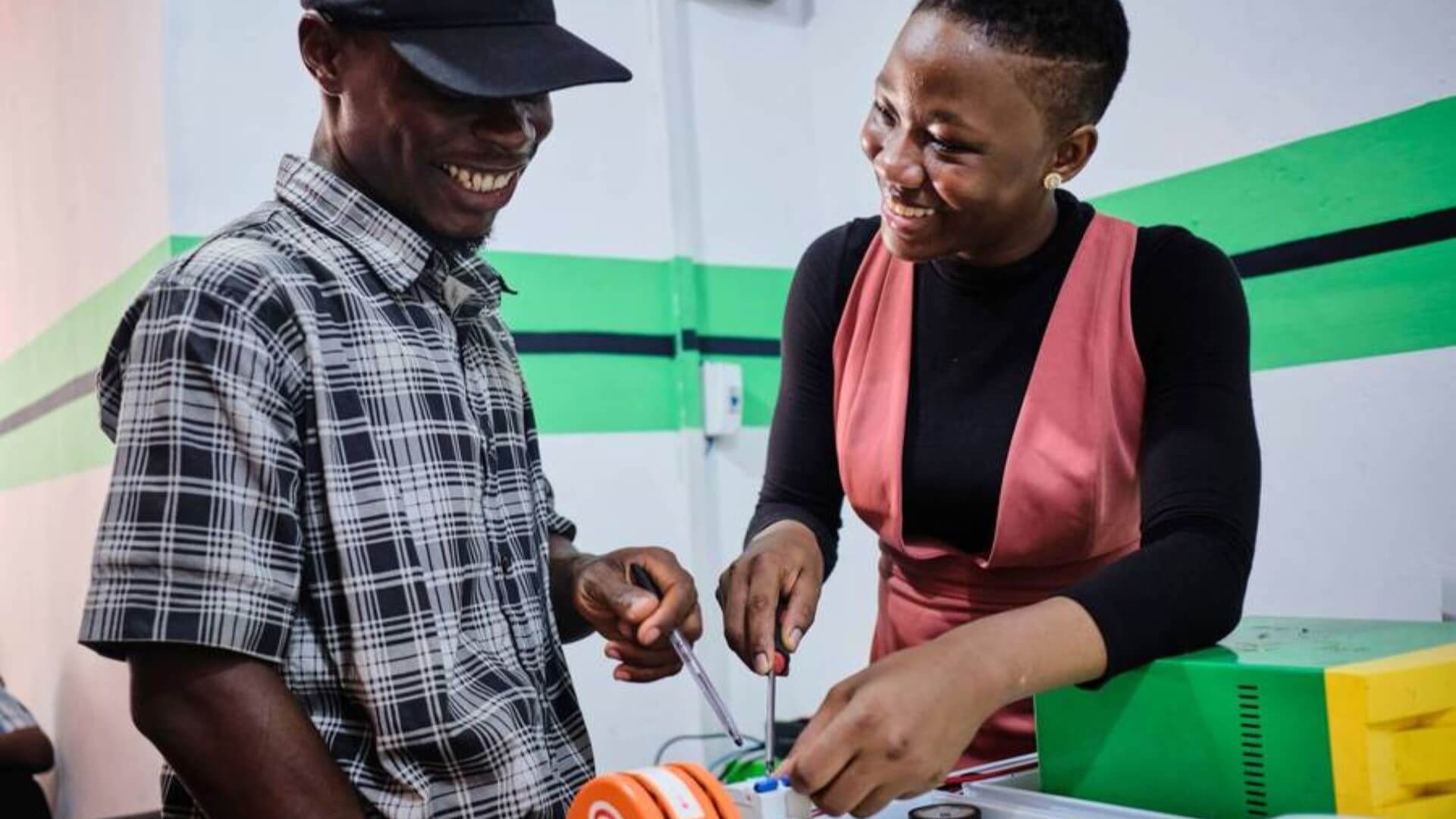
STEM training by BuraSolutions Solar Power Academy in Nigeria to empower women and marginalised people
Photo: Emeke Obanor/ Ashden
Education is key to changing people’s lives, particularly for women and marginalised people in rural African communities.
Blessing Gogo lives in the urban slum of overcrowded Port Harcourt, Nigeria. Plagued by poverty and limited opportunities, she enrolled at the BuraSolutions Solar Power Academy (a partnership with the Bori Business School) as a trainee. The solar power training programme aims to empower marginalised communities, young girls and women, providing trainees with the STEM (science, technology, engineering and mathematics) skills to install and maintain solar power systems.
Gogo had always struggled to make ends meet for her family. The solar power training will not only equip her with useful technical skills, but she will also become the first woman in her community to start a solar panel installation business, breaking societal norms and stereotypes.
With her newfound knowledge, Gogo will install solar panels providing electricity to households that mainly rely on fossil fuel powered generators because of poor electricity supply in Nigeria. She plans to employ other women from the community when her business grows, creating a supportive network of female entrepreneurs.
‘Solar power training opened doors for me that I never thought possible. I will become a role model for other women and contribute to the betterment of our community. Solar energy will not only brighten our homes but also our futures,’ says Gogo.
Integrating clean energy 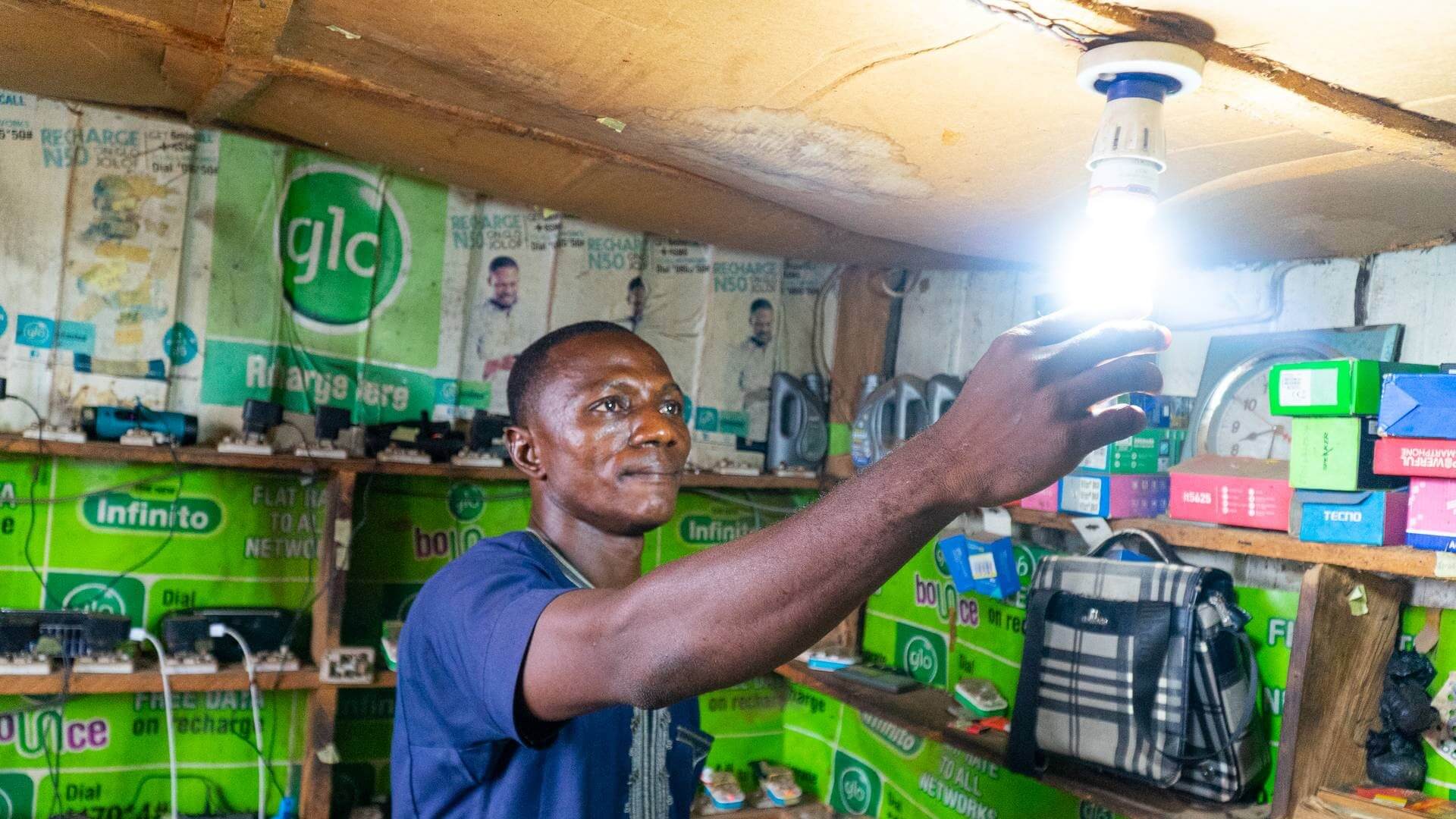
Husk Power Systems helped John Dauda Bahari convert his phone charging business from a diesel generator to solar power
Photo: Mayam Turaki / Ashden
John Dauda Buhari runs a small mobile charging shop and used to rely on a diesel generator to run his business. Buhari would spend about £2 a day (N2,000) buying diesel to run his generator for about 12 hours. Sometimes he had problems finding sufficient fuel. What’s more, the generator tended to breakdown about three times a week.
Fortunately, Husk Power Systems, a solar power provider for hybrid power generation, came to the village and solved his problems with a solar electricity supply that allows him to run his phone charging business round the clock if required.
Through its Nigeria Sunshot initiative, Husk Power, a leading rural energy services supplier for weak-grid and off-grid communities in Africa and Asia, plans to build at least 500 clean energy mini-grids by 2026, supporting businesses, schools and hospitals, to benefit over 2 million people and displace at least 25,000 diesel generators.
Energy transformation 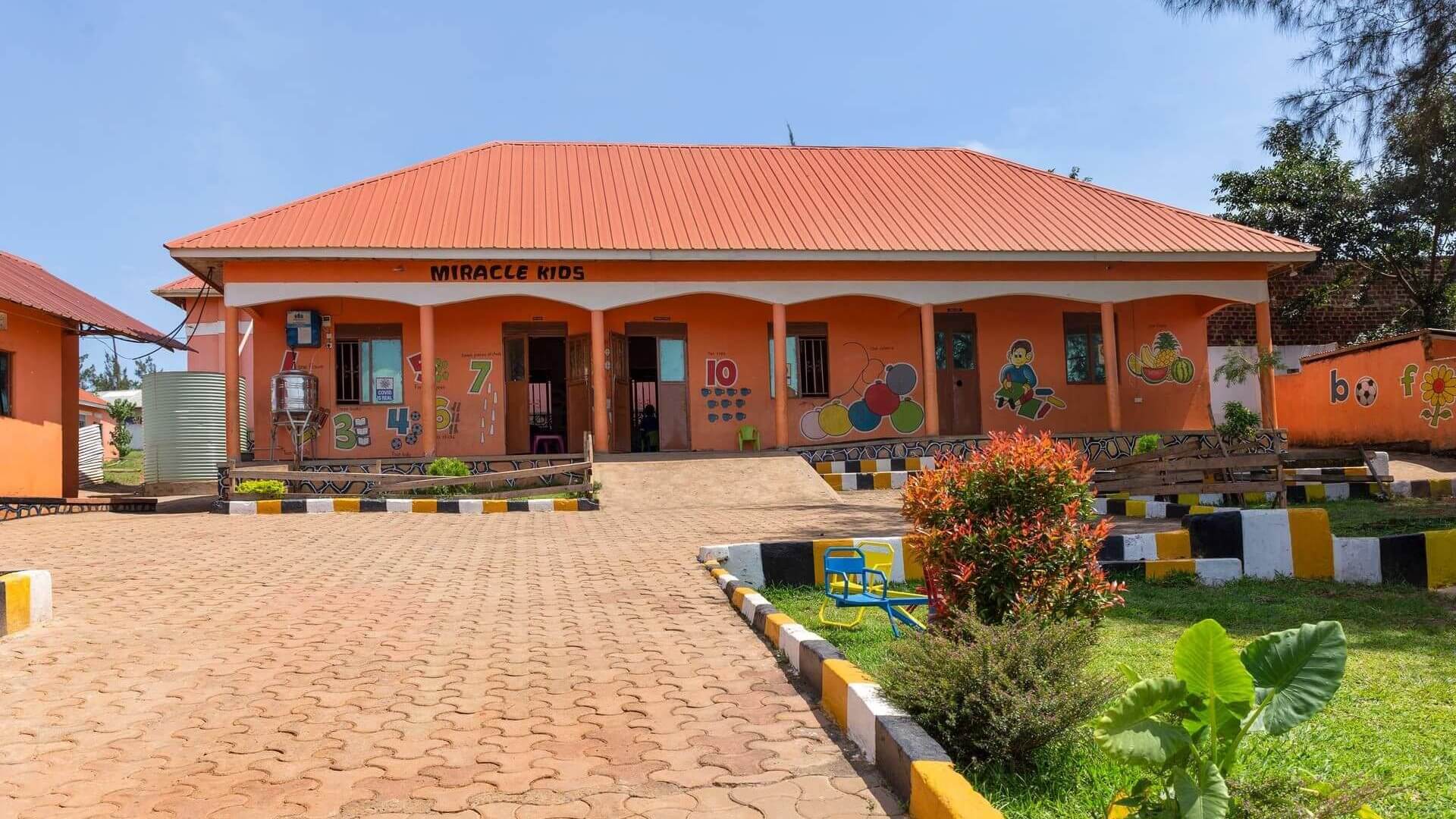
Solar power has revolutionised the learning environment at the Miracle Kids Nursery and Primary School in Uganda
Photo: Miriam Watsemba / Ashden
Over 600 million people in Africa currently go without electricity – mainly those living within small towns and villages. Centralised grid operators and decentralised renewable energy firms have both struggled to provide energy for these communities. Indeed, half of Africa’s population lacks access to the kind of electricity needed to power mobile phones, light homes and schools and support local businesses.
Power for All’s Utilities 2.0 Twaake pilot project at the Ugandan village of Kiwumu has pioneered a new approach, using centralised and decentralised energy companies to achieve faster and cheaper electrification, boost rural livelihoods and end energy poverty. Bridging the gap between local villages and the Ministry of Energy, it helps hundreds of stakeholders to work together.
The Utilities 2.0 Twaake project includes Umeme, the main Ugandan utility, and other partners in off-grid clean energy companies, including Equatorial Power, East African Power and Energrow, to create a local energy ecosystem at low cost, with grant funding by the Rockefeller Foundation. Umeme had found that first-time energy users typically used ‘little or no energy’ when first connected to the grid. This changed with connection to solar power.
The introduction of electricity to John Odongo’s Miracle Kids Nursery and Primary School in the village of Konero, Uganda, where he is headmaster, has brought about a remarkable transformation. Before the school was connected to the power grid, smartphones were considered to be a luxury limited to a few individuals. People had to walk to distant charging points, and teachers used small phones with batteries that had to last at least five days. The absence of electricity posed numerous challenges. Conducting remedial lessons was nearly impossible due to the lack of sufficient lighting towards the end of the day.
However, the arrival of electricity changed everything. Connection of the school to solar power by Power for All not only revolutionised the learning environment but also enhanced various administrative processes. Installation of an electricity-powered water tank provided the school with its own water source, and eliminated the need for teachers to fetch water from the community borehole. Laptops are now used, and the school’s secretary can type and print all necessary documents, where previously she had to travel to Nakasajja to type a letter.
‘Access to electricity has expanded educational opportunities and empowered the students, teachers and staff to reach new heights,’ remarks Odongo.
‘Clean energy is bringing new jobs and better standard of living to Africa - where 600 million people still go without power’ – Dr Stephen Hall, Ashden’s Head of Awards
Encouraging entrepreneurship 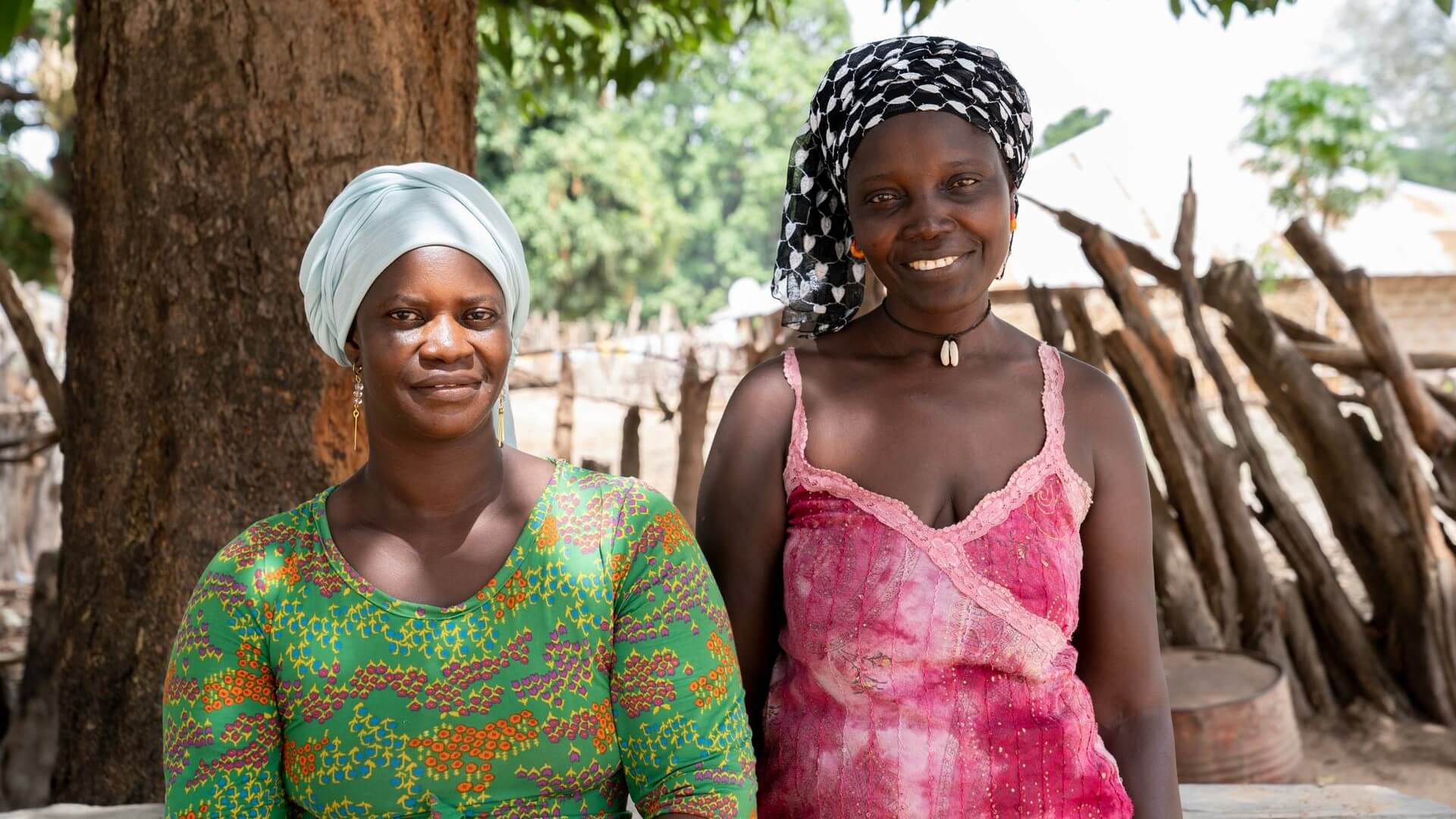
ACRA energy service agent Khadijatou Manga (left) installed solar kit for Adama Badiane (right) in an unelectrified village in Senegal, and helps her with business planning
Photo: Laeila Adjovi / Ashden
Fonazione ACRA (Associazone di Cooperazione Rurale in Africa), based in Dakar in Senegal, is committed to removing poverty through enterprises with high social and economic impact, encouraging local entrepreneurship to strengthen community-based initiatives. ACRA has introduced solar energy to small community businesses often in unelectrified villages.
Mame Diarra Badiane is a mother of five with a small home business selling tea, oil, biscuits and soap, as well as farming some vegetables to support her family. She had no bank account until a few months ago and admits: ‘I was afraid of the bank.’
Recently, she was selected to be one of beneficiaries of the Women Empower programme and received training in entrepreneurship. Badiane was guided to draw up a business plan and then obtain a bank loan. With it, she opened a grocery shop powered by a solar system – the only one in the remote village of Oufoulo. Badiane is illiterate and was understandably scared of keeping the books, but now ACRA’s field agents help with running her small business.
Powering refugees and displaced people 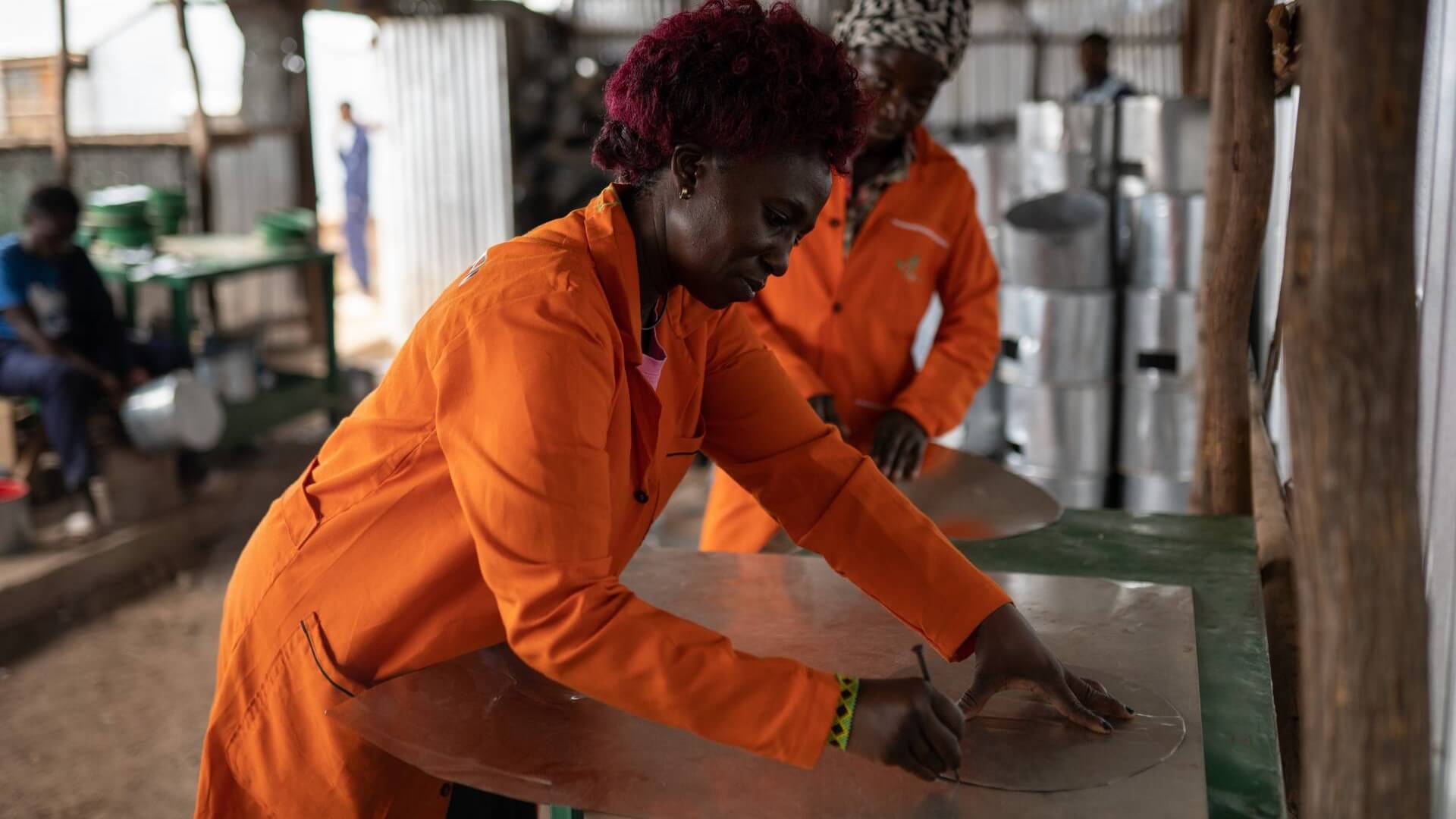
Luci Wairimu works at USAFI Green Energy manufacturing low-carbon cookstoves
Photo: Kelvin Juma / Ashden
Cooking using a traditional wood burner is both inefficient and unsafe, producing heavy smoke emissions in rural homes. USAFI Green Energy was a finalist in the Ashden Awards for Powering Refugees and Displaced People. The company manufactures and supplies affordable, low-carbon cookstoves in Kenya’s Kakuma Refugee Camp, creating work for displaced people. Their cookstove cuts down on smoke and soot by more than 60% compared to the widely used Kenyan ceramic jiko, and limits deforestation because of reduced wood burning using a locally produced briquette.
Supa Agule and her colleagues cook at the Kakuma Refugee Camp Reception Centre and now use large low-carbon cookstoves supplied by USAFI Green Energy to prepare meals serving over 3,000 refugees.
‘We used to experience a lot of smoke and heat from this kitchen when we used the traditional, open, three-stone cookstove and most staff fell sick often due to these conditions before we installed these large low-carbon cookstoves.’ With a controlled heat mechanism on the cookstoves, Agule and her colleagues experience a safer and more effective cooking environment. They can now provide a vital flow of food and other supplies from aid organisations at the reception centre for incoming refugees.
Powering agriculture 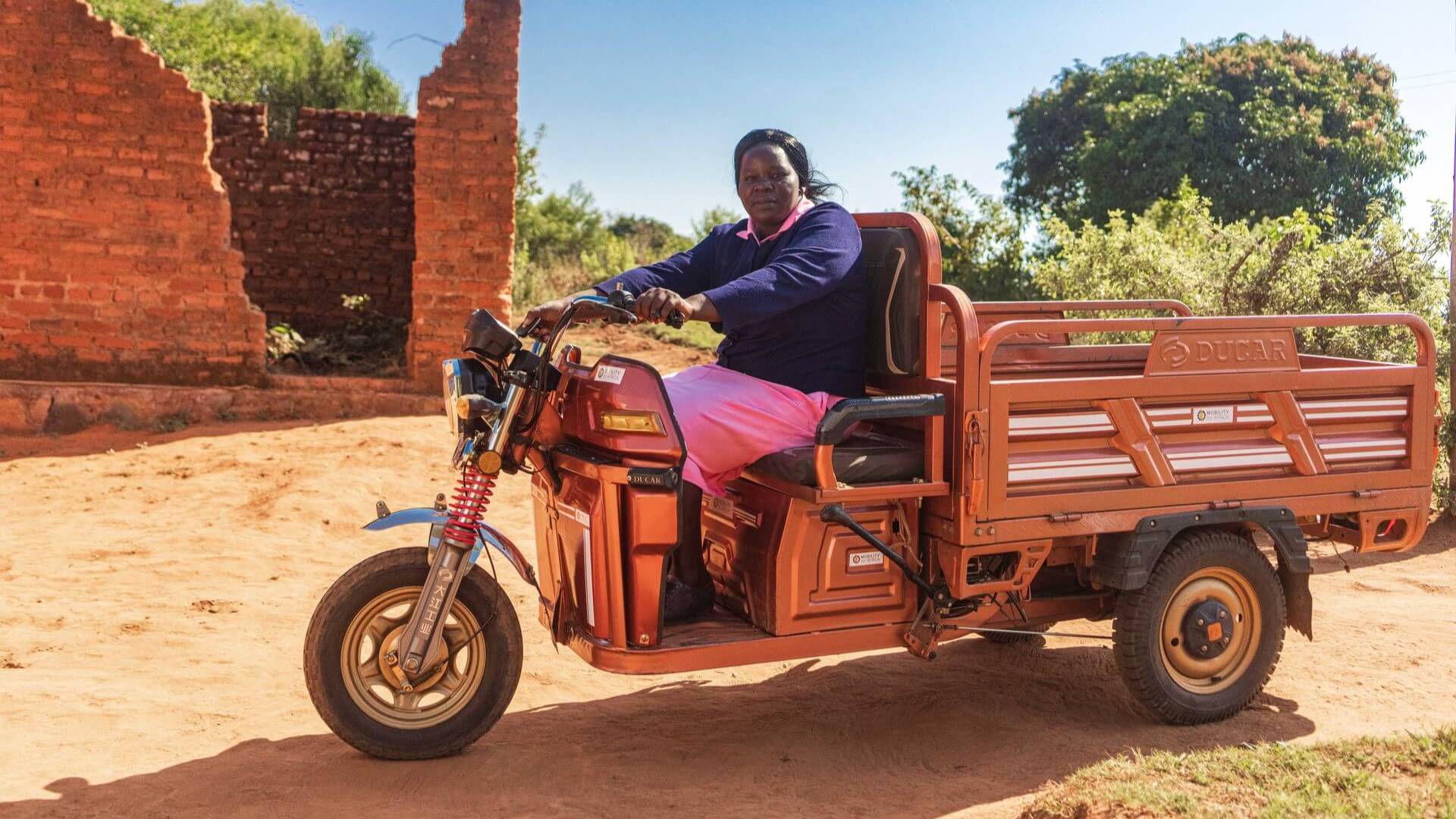
Mobility for Africa’s Hamba custom-built electric tricycles provide transport for rural women
Photo: Steven Chikos / Ashden
Electric transport has an important role to play in the energy transition. Hamba custom-made electric tricycles from Mobility for Africa provide transport for rural women, boosting their livelihoods and giving access to social services.
By leveraging technology know-how and manufacturing skills from the e-mobility revolution, Mobility for Africa is producing low cost, renewable-powered electric tricycles for a rural, off-road, and often off-grid, environment. The company has operations based in Zimbabwe and plans to expand to Zambia.
Having spent four years in research and development and pilot testing of green mobility solutions in rural Zimbabwe, the company has developed an e-tricycle along with an off-grid charging station and battery swapping model.
Pauline Ndlhovu is in the dairy business and acquired her Hamba electric tricycle in August 2022. Previously, she used to carry the 20-litre milk can for a distance of 7 km twice a day, and back empty. Some days she would fail to make the milk delivery because of fatigue and time constraints. However, since acquiring the e-tricycle her life has been transformed economically and socially.
The overall winner
Power for All was named as the overall winner of the Ashden Award for Integrated Energy Africa, and Husk Power was given a Special Award for outstanding achievement because of its rapid expansion since winning a previous Ashden Award in 2011.
Looking at the broad ranging and inspiring selection of Ashden Award winners, Dr Stephen Hall, Ashden’s Head of Awards, emphasises: ‘Clean energy is bringing new jobs and better standard of living to Africa – where 600 million people still go without power, and many more don’t have access to safe and modern cooking technology. Our Ashden Award winners show that collaboration – between funders, governments, businesses and communities themselves – will be key to ending energy poverty forever. There’s no shortage of ambition on the continent, whether that’s tackling electrification on a national scale, or bringing power to the most marginalised.’
With COP28 on the near horizon, he challenges the Global North to step up to the mark and says: ‘Now Global North governments and other funders must meet their climate pledges – and invest in Africa's clean energy trailblazers.’
